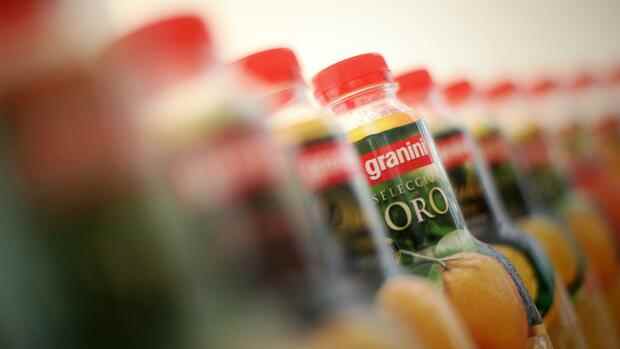Beverage manufacturer Granini wants to pass on the increased costs to customers.
(Photo: dpa)
Dusseldorf The head of Eckes-Granini doesn’t even try to dress it up: “The dispute with Edeka hit us hard,” explains Tim Berger. A dispute over prices had escalated. The company’s juices have therefore disappeared from the shelves of Edeka and its subsidiary Netto since May 2021.
When asked, Berger did not want to say exactly how much sales that cost. However, he describes Edeka as the most important customer in Germany. But the development of Granini’s market share speaks volumes: last year, it fell by two percentage points to 10.8 percent, as the company announced when it presented its annual results.
According to Statista, juice worth around eight billion euros was sold in Germany last year. As a result, Eckes-Granini is likely to have lost a three-digit million amount in sales in its most important market – which still accounts for almost a third of the business.
Accordingly, Berger is trying to finally settle this dispute. “We are now having very constructive talks with Edeka and are confident that we will find a solution relatively soon,” he emphasized. Edeka did not want to comment on this when asked.
Top jobs of the day
Find the best jobs now and
be notified by email.
This could be made easier by the fact that almost all retailers across the board are raising food prices in the wake of the war in Ukraine. The understanding of the customers for price increases has grown. “The current context can make the price talks a little easier,” admits the Granini boss.
Edeka is said to have copied the Granini bottle
Retail is using the exceptional situation to push through price increases to an extent that it has never dared to do before. Rewe boss Lionel Souque said that the retailer had already waived a three-digit million amount in the margin in the first quarter in order to prevent an even sharper price increase.
>> Read here: An exclusive evaluation shows which products are expensive and scarce in the supermarket
In 2021, food prices rose by around five percent on average. But now there are massive increases across the board. Aldi made the start. The discounter has already increased the prices for hundreds of products, some in the double-digit percentage range, and all other retailers are now following suit.
In fact, the dispute between Granini and Edeka seems almost bizarre in the current situation. According to information from industry circles, Granini is said to have demanded a price increase of six percent for its products such as Hohes C, which Edeka rejected.
But the argument wasn’t just about prices. Edeka had filled its own brand into bottles that looked so similar to the Granini bottles that the juice manufacturer sued the retailer for trademark infringement – and ultimately won in court. “The legal dispute protracted the talks,” says Berger. “But we can’t make any compromises.”
Granini can therefore look back on a “difficult year with ups and downs”. This was also due to the consequences of the corona crisis and poor harvests for numerous types of fruit. The costs for raw materials and packaging alone rose by 15 million euros. Accordingly, the pre-tax result in 2021 fell from 71 to 57.2 million euros.
Costs increase by around 50 million euros
Berger warns that the situation will worsen again this year. Granini expects additional costs of around 50 million euros. Consumers should also feel this. Further price increases for the manufacturer’s juices are “inevitable”, explains the Granini boss.
A timely agreement with the German market leader Edeka would be helpful, as Eckes-Granini has set itself quite ambitious growth targets. The family business wants to achieve net sales of one billion euros for the first time in 2025.
The head of Eckes-Granini looks back on a “year with ups and downs”.
The manufacturer had almost reached this mark in 2018 with 985 million euros. Since then, sales have fallen steadily to 856 million euros. In its growth plans, Granini is focusing in particular on the fast-growing Scandinavian markets and on new product categories.
The company introduced so-called shots under the brands Hohes C and Joker, highly concentrated juices with ginger or turmeric that are supposed to strengthen the immune system. Another growth driver should be the desire for more sustainability.
Granini’s answer: concentrates that the customer dilutes with water at home. The aim is to reduce CO2 emissions from granini juices by more than 60 percent through less packaging and lower weight. Perhaps the customer will then overlook one or the other price increase out of a clear conscience.
More: Aldi is raising prices – groceries are becoming even more expensive
